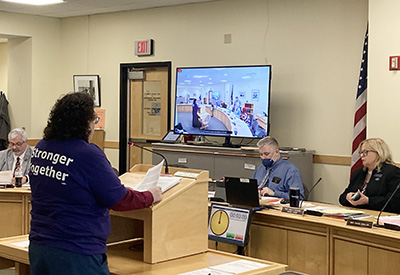Bargaining News
|February 16, 2024
Qualified individuals aren’t applying for state jobs due to the low wages

MSEA-SEIU Member Winifred Malia testifies in support of LD 2121, An Act to Address Chronic Understaffing of State Government, sponsored by Representative Drew Gattine.
Senator Nangle, Representative Stover, members of the Committee on State and Local Government, my name is Winifred Malia and I live in Scarborough. I am a Principal Economic Research Analyst, I have worked for the Maine Dept of Labor almost 37 years, and I am the current Chapter President of the Eichel-Crinion Chapter of the Maine Service Employee Association. I am submitting this testimony on my own time, using my own personal devices in support of LD 2121, An Act to Address Chronic Understaffing of State Government Positions.
As you know, the Dept of Labor provides vital services for the State of Maine such as employment and training services for workers and employers, workplace safety training, wage and hour standards, services for the blind & visually impaired, deaf, hard of hearing & late deafened, vocational rehabilitation, labor market information, and economic stability from unemployment benefits while workers find reemployment. In order to provide these services, the Dept of Labor needs to be able to fully staff the positions. Retention and recruitment of qualified employees is made more difficult as the pay gap widens without any meaningful progress to close it.
The pay gap is causing positions to remain vacant or employees to accept positions elsewhere because the wages are on average 20% lower than similar public and private sector positions. There are regular job postings for rehabilitation counselor, career center consultants, occupational safety specialist, and customer service representatives to name a few because qualified individuals are not applying due to the low wages. There are numerous employees that have or will be retiring in the next few years. These positions need to be filled with qualified individuals and that will only happen if wages are competitive.
The Administration still does not admit that a pay gap exists – page 4 from the Report and Recommendations of the Maine State Government Classification and Compensation Plans Study. The pay increases from the collective bargaining contracts keeps wages close to wage increases that occurred across the entire State – private sector and government over the same time period. These contracts did nothing to address the pay gap presented in every study over the last 20 plus years. Page B-76 from State of Maine Market Study Report November 20, 2020 shows the pay gap for my position is 23-26% below the market rate. I provide analysis on the Unemployment Compensation Trust Fund and legislative proposals. When will the Administration respect the services I provide and address this pay gap? The wage increases from collective bargaining are only cost of living adjustments but does not address the pay gap.
The Administration states that there have been over 3,000 reclassifications and reorganizations out of more than 5,500 which is a start but it is not finished. Questions to ask – when will the other 45% be complete? -were the reclassification and reorganizations band-aid fixes or did they bring wages inline with market rates?
Last year’s budget increased the next Governor’s salary from $70,000 to $125,000 (79%) and the next legislative salaries practically doubled. State workers are asking to be treated with respect by bringing wages inline with current market rates. As Representative David Woodsome said about raising the pay for members of the Legislature – “it is long overdue.” I think resolving the pay gap is long overdue as well. Now is the time to use some of the surplus on the employees of the State of Maine.
The pay gap has been an issue for the last 20 years with no meaningful efforts to resolve it. Morale is affected when some employees are given stipends or reclassifications and reorganizations while 45 percent are still waiting. Recruitment and retention will continue to exist until the pay gap is addressed over all state government. I was on the MSEA Bargaining Team 2 years ago, the administration says that the pay gap should not be a bargaining issue but a legislative issue. I feel the pay gap should be just as important an issue as raising the salary of the Governor and members of the Legislature.
I am asking that you support LD 2121 which helps to provide the funding to continue this work for the workers of the Dept of Labor and the rest of the Executive Branch that serve the citizens of the State of Maine every day by closing the pay gap. I want to thank the committee for listening and I will answer any questions you may have.